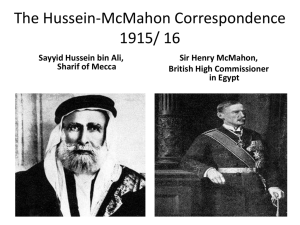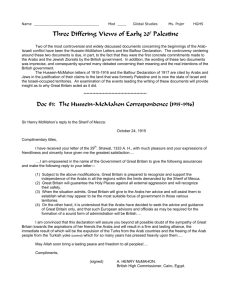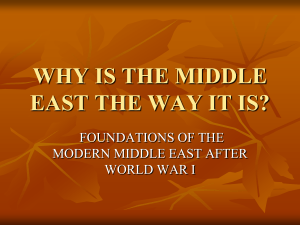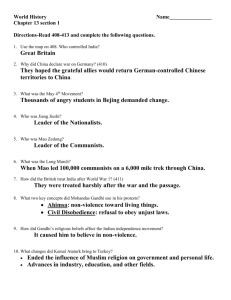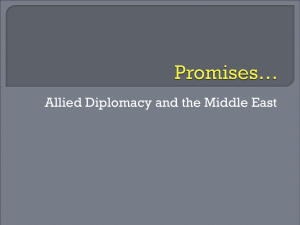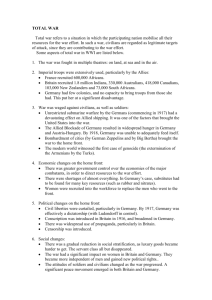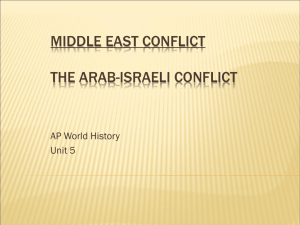question 6 outline world war I
advertisement
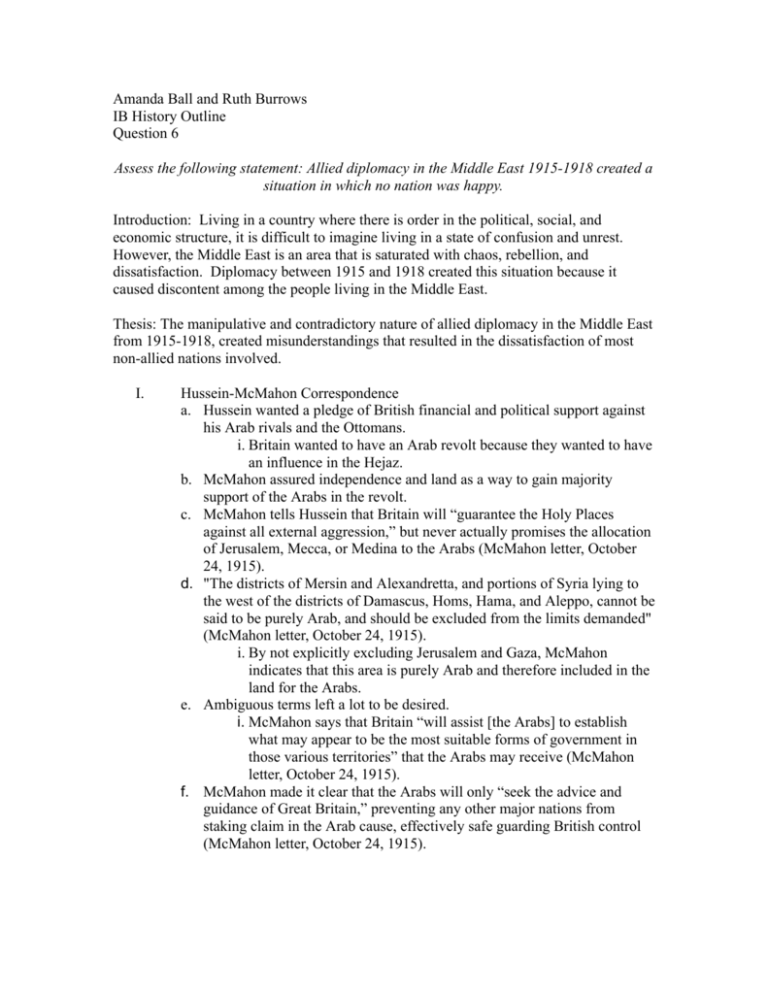
Amanda Ball and Ruth Burrows IB History Outline Question 6 Assess the following statement: Allied diplomacy in the Middle East 1915-1918 created a situation in which no nation was happy. Introduction: Living in a country where there is order in the political, social, and economic structure, it is difficult to imagine living in a state of confusion and unrest. However, the Middle East is an area that is saturated with chaos, rebellion, and dissatisfaction. Diplomacy between 1915 and 1918 created this situation because it caused discontent among the people living in the Middle East. Thesis: The manipulative and contradictory nature of allied diplomacy in the Middle East from 1915-1918, created misunderstandings that resulted in the dissatisfaction of most non-allied nations involved. I. Hussein-McMahon Correspondence a. Hussein wanted a pledge of British financial and political support against his Arab rivals and the Ottomans. i. Britain wanted to have an Arab revolt because they wanted to have an influence in the Hejaz. b. McMahon assured independence and land as a way to gain majority support of the Arabs in the revolt. c. McMahon tells Hussein that Britain will “guarantee the Holy Places against all external aggression,” but never actually promises the allocation of Jerusalem, Mecca, or Medina to the Arabs (McMahon letter, October 24, 1915). d. "The districts of Mersin and Alexandretta, and portions of Syria lying to the west of the districts of Damascus, Homs, Hama, and Aleppo, cannot be said to be purely Arab, and should be excluded from the limits demanded" (McMahon letter, October 24, 1915). i. By not explicitly excluding Jerusalem and Gaza, McMahon indicates that this area is purely Arab and therefore included in the land for the Arabs. e. Ambiguous terms left a lot to be desired. i. McMahon says that Britain “will assist [the Arabs] to establish what may appear to be the most suitable forms of government in those various territories” that the Arabs may receive (McMahon letter, October 24, 1915). f. McMahon made it clear that the Arabs will only “seek the advice and guidance of Great Britain,” preventing any other major nations from staking claim in the Arab cause, effectively safe guarding British control (McMahon letter, October 24, 1915). II. Sykes-Picot Agreement (May 1916) a. British held secret discussions with their allies about dividing the Ottoman Empire into spheres of influence between Britain and France. i. The Sykes-Picot agreement came out of these discussions. b. Sykes and Picot divided the Levant and Iraq areas into sections in which they would utilize direct or indirect influence. c. The territory west of the Jordan River, including Jerusalem, would be under international administration. i. Semi-independent Arab states would be established in areas of indirect French or British control. d. The British indicated that the Arabs would receive the towns of Homs, Hama, Damascus, and Aleppo in exchange for cooperating with the Allies. e. The discussions between the British and French did not refer to the previous Hussein-McMahon explicitly. f. Sykes-Picot Agreement contained some terms that contradicted those of the Hussein-McMahon correspondence. i. McMahon explicitly stated that the towns of Homs, Hama, Damascus, and Aleppo were to be excluded from any land that the Arabs would receive, while the Sykes-Picot agreement stated that these towns would be granted to the Arabs, under French rule. III. The Balfour Declaration (November 2, 1917) a. During the course of World War I, Britain and France recognize the Jewish population’s influence in (the United States and) Russia’s presence in the war. b. British officials decided to extend a “gesture of goodwill” to persuade Jewish population (especially those involved in the revolution) to support allied powers (Cleveland 237). c. Balfour uses ambiguous phrasing to state that Britain supports the “establishment in Palestine of a national home for Jewish people” (Balfour Declaration). ii.Although Balfour specifies the use of Palestine for this purpose, no one has agreed at this point what Palestine actually is; the phrase “in Palestine” also suggests that this “national home” will not take up all of Palestine, whatever that may be. d. Balfour says that the British government “will use their best endeavors” to help create this national home. i. This language doesn’t specify how or to what extent Britain will reach the goal. e. Balfour states that the “civil and religious rights of existing non-Jewish communities in Palestine” should be protected and not jeopardized as a result of the creation of this Jewish home. IV. V. i. This phrase notably does not include political or economic rights of the non-Jewish communities in Palestine. System and Organizational Levels of Analysis of Allied Diplomacy 19151918 a. Neo-Realism says that because anarchy dominates international relations, states will pursue power to protect themselves. i. This is illustrated by Britain’s diplomatic actions (see above). b. The Balance of Power Theory says that when states are equal in abilities, they are less likely to go to war. i. Due to the imbalance of power that existed before and during World War I, Britain’s diplomatic actions perpetuated political and civil unrest in the Middle East. c. The Organizational Level says that institutions will bargain with each other to create a foreign policy that is a compromise between competing organizations. i. Britain’s negotiations regarding the Middle East consisted of compromises that contradicted one another, thus creating confusion and discontent within the nations involved. National Responses to Allied Diplomacy in the Middle East a. The Jewish nation, especially Zionists, were upset by the terms of both the Hussein-McMahon Correspondence and the Sykes-Picot Agreement. Eventually, the Balfour Declaration satisfied their desire for land in the Middle East, but the ambiguity of the declaration lacked specifics regarding the national home in Palestine. b. The Arabs were upset by the negotiations of Britain regarding the Balfour Declaration and the Sykes-Picot Agreement. They also felt cheated by McMahon’s vague promises that put them at the mercy of the British. c. The Ottoman Empire and Germany were upset because they missed the opportunity to regain control in the Middle East. d. France and Russia received land in the various negotiations and therefore were only wary of the amount of control that Britain had retained in the Middle East. e. Britain was pleased as a result of the various negotiations; by utilizing negotiations to appeal to opposing groups (the Arabs and the Jews), Britain was able to control negotiations of land and power in the Middle East. This is evidence of the manipulative nature of Allied Diplomacy, specifically fueled by the British government, during World War I. Conclusion: Allied diplomacy was not calibrated and therefore was very contradictory which generated many misunderstandings. The false promises to the Middle Easterners naturally created dissatisfaction. The Arabs, Jews, and Ottomans were all affected by the allied diplomacy, because the allies created policies that were in their best interest. Clearly this would cause the people on the receiving end of these policies to not be satisfied with them. The Hussein-McMahon correspondence, Sykes-Picot Agreement, and Balfour Declaration all resulted in discontent between nations involved because of the contradictory nature of the agreements and the failure to achieve a compromise.
